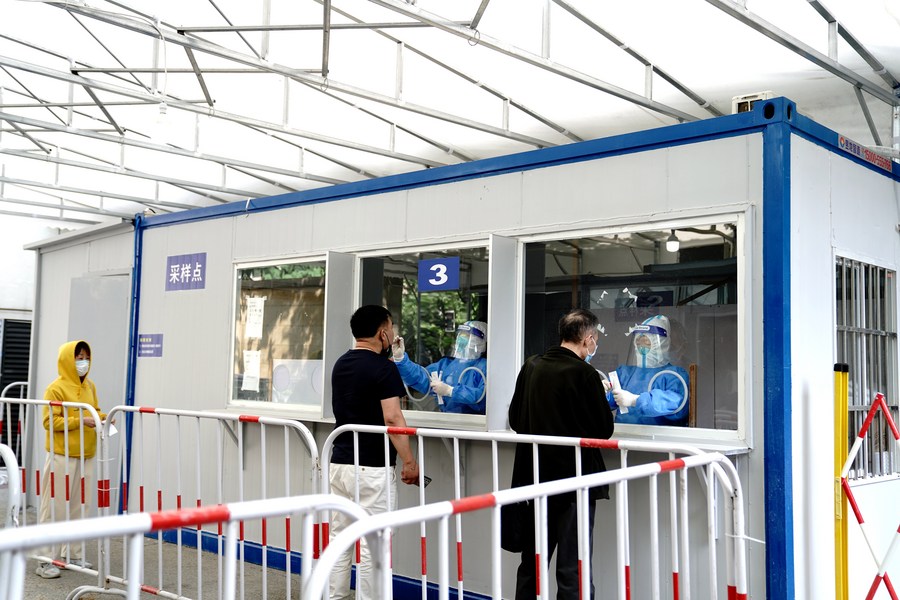China's dynamic zero-COVID policy benefits the world

Citizens take nucleic acid tests at a testing site in east China's Shanghai, April 27, 2022. (Xinhua/Zhang Jiansong)
* China's dynamic zero-COVID approach has not only quickly cut viral transmission in the shortest time possible but also brought tangible benefits to the whole world.
* By adhering to its dynamic zero-COVID approach, China has spared no efforts in safeguarding people's lives and well-being, and has minimized the epidemic's impact on economic and social development. It also plays a vital role in maintaining the stability of the global supply chain.
* Despite mounting domestic and external uncertainties, China still remains a hotspot for foreign investors seeking predictable market opportunities at a difficult time amid the COVID-19 epidemic.
BEIJING, May 2 (Xinhua) -- As the Omicron variant has posed severe challenges to the faltering global economic recovery amid surging infections, China's dynamic zero-COVID approach has not only quickly cut viral transmission in the shortest time possible but also brought tangible benefits to the whole world.
The country's economy got off to a steady start in 2022 in the face of global challenges and a resurgence of COVID-19 cases, with its gross domestic product (GDP) growing 4.8 percent year on year to 27.02 trillion yuan (about 4 trillion U.S. dollars) in the first three months, quickening from a 4 percent increase in the fourth quarter last year.
China's strong economic performance has been a boon for global economic stability and growth, said Cavince Adhere, a Kenya-based international relations scholar.
GLOBAL-ECONOMY STABILIZER
Progress has been made in China's latest battle with COVID-19. After weeks of arduous control and prevention efforts, community transmission has been cut in the cities of Jilin and Changchun in Jilin Province, where life is returning to normal and the resumption of production is accelerating. The number of new infections in Shanghai is also going down.
As the world's second largest economy, China has played a key role in promoting the recovery of the global economy and stabilizing the industrial and supply chains.
"Countries that followed the zero-COVID playbook have done better on every measure, from death rates to economic growth," said British science writer Michael Marshall on the New Scientist in late March. "If more nations had implemented this approach, humanity would be in a better place."
China has seen an accelerated pace of resumption of work and production in key areas and industries. In Shanghai, 86.8 percent of enterprises of the 666 companies included in the first batch of the "white list" had resumed work by April 28.
U.S. carmaker Tesla's Shanghai factory officially resumed production on April 19, with about 8,000 employees back to work as of April 28, the company has said.
Deliveries from the Shanghai Gigafactory stood at 484,130 vehicles last year, an increase of 235 percent from 2020, accounting for 51.7 percent of Tesla's global production capacity in 2021.
 "By adhering to its dynamic zero-COVID approach, China has spared no efforts in safeguarding people's lives and well-being, and has minimized the epidemic's impact on economic and social development. It also plays a vital role in maintaining the stability of the global supply chain," said Ma Yunjie, head of the factory of the gas springs manufacturer Stabilus's branch in east China's Zhejiang Province.
"By adhering to its dynamic zero-COVID approach, China has spared no efforts in safeguarding people's lives and well-being, and has minimized the epidemic's impact on economic and social development. It also plays a vital role in maintaining the stability of the global supply chain," said Ma Yunjie, head of the factory of the gas springs manufacturer Stabilus's branch in east China's Zhejiang Province.
Ma said the factory's overall capacity utilization rate now stands at around 85 percent, and its orders will gradually return to the pre-epidemic situation in about two weeks.
The factories of Xuzhou Construction Machinery Group Co., Ltd. (XCMG), a leading Chinese machinery manufacturer, are busy these days, with international orders from South America and other regions now lining up until November.
"The containment of sporadic COVID-19 resurgences has boosted the construction of overseas infrastructure with undisrupted exports," said Wang Min, chairman of XCMG. "The machinery products of XCMG are actively facilitating the quick resumption of local production."
Shenzhen, a tech hub in southern China and one of the country's major foreign-trade centers, has seen businesses resume work and production.
A worker surnamed Shi from the Shenzhen factory of Foxconn, a major supplier of Apple, attributes the quick resumption to China's dynamic zero-COVID policy. "On March 21, operations were basically back to normal after several days of shutdown caused by the epidemic, which will ensure a regular supply of iPhones around the world," Shi said.

FAVORABLE BUSINESS ENVIRONMENT
Despite mounting domestic and external uncertainties, China still remains a hotspot for foreign investors seeking predictable market opportunities at a difficult time amid the COVID-19 epidemic, thanks to the country's unremitting efforts in optimizing its business environment.
Foreign direct investment into the Chinese mainland, in actual use, expanded 25.6 percent year on year to 379.87 billion yuan in the first quarter of the year, according to the Ministry of Commerce.
Customs in Nanjing, capital of east China's Jiangsu Province, has maintained 24-hour communication with airports, airlines and freight forwarders, to ensure the smooth clearance of commodities. Now, Nanjing has opened two cargo charter flights to Europe and North America, with six flights a week and single cargo throughput of about 100 tonnes.
 Meanwhile, China's outbound investment continues to rise. China's non-financial outbound direct investment reached 170.95 billion yuan in the first three months of the year, up 6.3 percent year on year, official data shows. In U.S. dollar terms, the non-financial ODI rose 8.5 percent from a year ago.
Meanwhile, China's outbound investment continues to rise. China's non-financial outbound direct investment reached 170.95 billion yuan in the first three months of the year, up 6.3 percent year on year, official data shows. In U.S. dollar terms, the non-financial ODI rose 8.5 percent from a year ago.
In the first two months of this year, enterprises in Jiangsu Province invested in 34 projects in the Regional Comprehensive Economic Partnership region, with a total contracted investment value of 430 million U.S. dollars on the Chinese side, up 635.3 percent year on year, accounting for 37.3 percent of the outbound investment of the province.
"China will continue to give full play to the advantages of its complete industrial and supply chains and its super-large market, improve the business environment and attract more investors to China. While developing itself, China will provide broader market opportunities to other countries," said Guo Liyan, a researcher with the Chinese Academy of Macroeconomic Research.
Photos
Related Stories
Copyright © 2022 People's Daily Online. All Rights Reserved.










